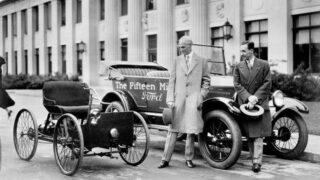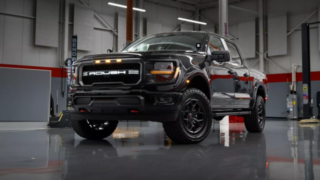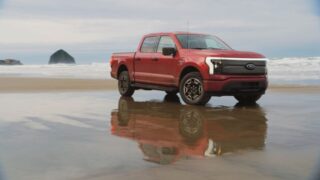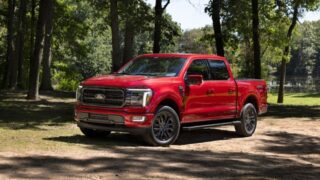WHAT TO LOOK FOR IN A CLASSIC FORD TRUCK: Part 2
Continued from Part 1
WHAT TO LOOK FOR IN A CLASSIC FORD TRUCK
WHERE TO START
PART II
driven/hauled/drug your new project home and stared at it sitting in the
driveway for over a week. Your wife has
walked around it, shook her head and headed back to the kitchen wordless. The
dog has marked all four tires. Now you’re wandering down the information
superhighway searching for revelations on your new prize.. Welcome to the rest stop on the Information
highway for newcomers (newbies) to old Ford trucks..
that at this point you already have a truck or are still at the very least, seriously looking for a truck armed with the
information from Part I above..
first task and this can even be done before your purchase
work truck for trips to the hardware store or nursery?
weekend driver for cruise-in fun, car shows,
and weekend enjoyment ?
daily driver ? Your principle mode of
transportation ?
show truck or trailer queen that is only pushed or driven onto or into trailers
and featured at high bling , high dollar car shows jacked up over mirrors and
surrounded by a corral and high intensity lighting, or perhaps on a turntable.
???
a cooperative effort between you and your truck, it might help to sit behind
the wheel and rest your arm on the window sill as you contemplate your future
together. Ask your truck what it wants to be and how it wants to look. It WILL reveal the answers to you. Hold the wheel and make vvvvvrrrrroooommmm
sounds like you going through the gears. Does it sound right, does it feel right ??? Or try making a humming sound, hhhhhmmmmmmm
like you’re cruising down the freeway on the way to a weekend car show. Imagine road tunes playing on the imaginary radio, does that feel better ?? The
answers await you if you listen.
agreeable decision will lead you down one (or two) major paths with little side
roads, some of those paths and roads are straight and easy, others are winding
and treacherous with switchbacks, washed out bridges and several u-turns.
ROAD
decision (after the above first decision) will be, do you want to start driving
the truck right now or after you’ve completed your
repairs/restoration/rodding. Having a
running vehicle to enjoy is good motivation to continue your improvements. If this is the case, I’d recommend making
changes/repairs that will contribute to the safety of you and your family. Repair or upgrade the brake system. Give the engine a going over. Change the fluids & filters, points and plugs…flush
out the fuel system. Go over the wiring
and cables to get the juices flowing. Of
course, tires and drive train need an inspection. Once you get it road worthy you can enjoy the
ride while you work on your plan.
hand .. if you’re itching to build your dream truck or it’s too far gone to
make it safe, forge ahead with a total frame off project
have decided what your truck will do and be, you need to decide how you want it
to look.
to look like the original, right ?? Everybody loves to see an old truck drive by, they wave and smile and
think about their daddy’s or granddaddy’s old truck that looked like
yours, except it was a different color and a had flat bed and it was a
Studebaker and one fender was smashed in, you WILL hear this story !
want a total restoration that includes period correct cloth covered wire, 6
volt electrical system, generator, color correct inspection paint daubs on the
firewall, itchy seat covers and bias ply tires?? OR
do you want something that ‘looks’ original but has been updated to include
real brakes, 12 volt (reliable) electrical system, auto transmission, power
steering, 6 way lumbar support seating
and seat belts ? The folks will still
wave, smile and tell you that Studebaker story, but you’ll be more
comfortable/safe riding by.
It might be the proper place to interject here that
as each one of these forks are chosen, consider this, it’s important. There is
an associated commitment, both physical and financial. Not a finite commitment, but a commitment
just the same. The amount of energy and
treasury is different for each path and has no ceiling nor limit on width,
depth, or time. I’d love to give you estimates, but there are
none. More on this later and a link to
more info. Back to the paths
restoration (for those who don’t know the difference yet) is a project that
attempts to rebuild or reproduce a car or truck to original condition. Some are extremely accurate, right down to
the inspection marks made in the factory with paint daubers, correctly color
coded cloth covered wire laced together with waxed string and perfectly reproduced
engine decals. Others are as simple as
staying true to original paint colors and rubber mats, using original parts or
reproductions. The meticulously restored
"Concours" type are rarely driven, sometimes never cranked and
usually trailered to events. The cost
can run into the hundreds of thousands of dollars for exotic models. But, many are drivers that are enjoyed daily
by their owners and those of us that spot them in grocery store lots and wave
at them along the road. These can
usually have a few thousand dollars invested and for my money are the best
‘restoration’ projects and the most fun to do.
If
you are going for a 100 point concours restoration some other rules apply. For
one don’t buy the best car you can afford, buy the absolute best truck
available. The money you pay up front for a restored show car is a fraction of
what you will spend getting a car to that level of restoration. Another item to
consider for restored cars concerns originality and history. A car with a
documented history of famous owners, competition or a landmark design feature
is considered more valuable because of its history and originality. In the
antique world it is called provenance and has marketable value. Since the ugly
subject of filthy lucre has reared its head, there is one thing that needs to be
explained right up front. This hobby is not about profit. Very few people ever
recover the expense of building a restored car or a street rod.
imagine most of us aren’t aiming for the Pebble Beach level of fit and finish
or harbor a hunka hunka burning desire to own one of Elvis’ Cadillacs. But one
of the rules above still applies, buy the best car out there, not the best you
can afford. The better the condition of the car when you start a project , the
easier your job will be.
Updated Restoration
path that many take, and it is a prudent one and can be much less costly than a
Concours restoration. Many of the purist
will search for months for one accessory or part and spend Jr’s college
tuition funds to get it. With the ‘updated’ path you can pick and choose the ‘hidden’ operational or comfort parts while keeping the outside
appearance of the truck stock looking. You can add safety upgrades, disc brakes and seat belts and still
maintain your ‘old truck look’. There are many aftermarket vendors who produce
add-on or replacement parts that work as well or better than the
originals. Upgrades include both front
and rear independent suspension systems, twelve volt conversions and wiring
kits, air conditioning, seat belts, power brakes and steering.
number of engine/transmission choices that you can put in these old trucks as
well as gear ratios that will make you a terror on the ‘mile or make for a
delightful cruise down the freeway. Here
you can mix and match what suits you and your needs/wants to make your restoration comfortable, safe and fun, your limits are only your imagination and budget.
approach follows much the same path as a restoration, but it’s much less
restrictive. With a rod, you can make
changes…as many and as radical as you’d like. Some folks (those restoration guys) refer to us rodders as living on ‘the dark side.‘ An example ?? I’m
building a 1953 F-100. So far I’ve
changed both front and rear suspension, added disc brakes, automatic
transmission, larger engine, and removed all door handles and locks. I’ve added a different seat, and a fiberglass
tilt front end. It’s still a ’53 F-100,
but it’s my idea of a ’53 F-100. That’s
what custom street rods are all about. Look at all the magazines… go to the shows and steal every idea you
like. Take pictures so you can remember
the details. Trust me… when you go to
a show with 500 + vehicles, things tend to run together in your mind… Kodak
never forgets.
Another point you should consider before heading down
one of these paths.. The use of this
truck just might include spouses and other family members. If you’re envisioning a full blown gasser and
your wife is picturing a ‘cute’ restored truck for weekend trips to her
favorite B&B or for tailgating at homecoming, there is going to be a
problem, input from others might be
helpful and considerate.
If you’re reading this, you are already aware of the Ford Truck
Enthusiasts Website. No matter what
model you choose or what year class, there is a wealth of information
accumulated there in forum archives and articles. The greatest resources are the members, many
of whom have been there and done that and can lead you around many expensive
mis-steps and pitfalls. Plus they are a
great support group for your addiction. We have a program but it has many more than 12 steps.
You need to start gathering your resources and
building a knowledge base here. Buy a shop manual… you can find them in
Motorhaven (on the FTE site), or other
truck book sites.
Give Mid-50 F-100 a call or go to www.midfifty.com and order a catalog… they have the best
breakdown pictures of assemblies and complete "I need it all" parts
kits available. All the sales people are
knowledgeable and can provide you with lots of tech info and suggestions.
Go to a bookstore… find the magazine section
and look for Classic Truck and Custom Classic Truck magazines… sadly both of
these, that were once good fab-it-yourself magazines are turning into
"bolt on our advertisers stuff" article collections… but they do
offer a good selection of vendors that sell what you will want/need/lust for. Order catalogs from the vendors. Not only do they show all the latest ‘stuff’
you need but usually have good tech information and drawings. Call the vendors and discuss your plan with
them. Many of them are truck builders
also and can steer you away from problems and mistakes before you make them,
both in time and money.
Check the 1948-1960 F100 forum on the FTE website for comments on specific
suppliers. The guys there call a spade a spade.
Plan on attending the F-100 Supernationals in
Knoxville (in May) or the Great Smoky Mountain F-100 Run in Pigeon Forge (in
June).There are other shows and gatherings on the left coast also, the Western
Nationals event is one example. The
magazines often have schedules of the shows across the country. You can see
hundreds of fine examples. Many are what
you wish you could do but can’t afford !! and some that you can.. Vendors are
available and ready to serve you. Do a
little Googling on the net looking for clubs or truck groups.. attend their
events and ask about joining and membership. They are always looking for new
members. Lots of the groups sponsor
charity events and fund raisers that donate to specific local charities. Besides the camaraderie they offer you an
opportunity to help others.
which path you choose–restoration, update or street rod, there is a sequence of
events that you sorta have to follow. For instance, you don’t paint before body
work. That may be a over simplified
example but hopefully it gets you thinking about what needs to be done in what order,
and helps you a little later with the cost estimate (like there is a way to accurately estimate cost. HA!)
computer an spreadsheet software. You could just as easily use a spiral
notebook or a three ring binder–draw
some columns. List your activities or
parts needed, whether you can or can’t do them, the cost (from catalogs or
estimates from shops) and a status column to keep you caught up and knowing
where you are. Don’t laugh, you can get
lost at times and forget to do some small thing that will be impossible to do
later after other parts have been assembled or finished.
|
seq |
Description |
me |
other |
cost |
Status |
|
|
23 |
Replace |
|
X |
1500 |
Scheduled |
|
|
24 |
Buy Ididit |
X |
|
300 |
Ordered |
|
|
25 |
Buy |
X |
|
300 |
Ordered |
|
|
26 |
Install |
X |
|
0 |
After susp. |
|
all the things you can identify, leave a few blank lines for things you’re
bound to forget. (this is where a
spreadsheet is sweet, you can easily add columns and it calculates cost automatically)
table will grow and expand.. usually vertically as you add supplemental items.
For instance… here’s an example of an Excel table that lists the
suspension/frame section. The sequence
column lets you sequence the work as you wish. This is a very early list and the columns have spread vertically and the
detailed steps filled in significantly.
TO
DO LIST SAMPLE
|
seq |
Description |
me |
other |
cost |
Status |
notes |
|
23 |
Replace |
|
X |
1500 |
Scheduled |
Call Bill |
|
24 |
Remove old axle/springs |
X |
|
|
|
|
|
25 |
Grind rivets and remove |
X |
|
|
|
|
|
26 |
Clean up front frame rails Fill in extra holes |
X |
|
|
|
|
|
|
|
|
|
|
|
|
|
27 |
Buy Ididit Ordered 4-5-7 |
X |
|
300 |
Ordered |
Shipping |
|
27a |
Buy U15N636CX736 U15N148CX736 |
X |
|
365 |
Ordered |
|
|
28 |
Install |
X |
|
0 |
After susp. |
|
Once you have an idea of how you want to build, sit down and come
up with a realistic estimate of the
cost. Heed the word "realistic".
(The column in your TO DO list for cost will help here.)
It’s amazing how guessing and research can differ at the bottom
line. If you sit down with a detailed
list of parts, pieces and work to be done your estimate will be considerably
more accurate. You can ask friends, use
the internet, and vendor catalogs for
resources, or talk to others who have built custom cars and trucks. Don’t – repeat – DON’T let the size of the
total project scare you. Think of it as
a lot of smaller less expensive projects. It will save your sanity, especially if you’ve never tried this type
project before. And, one more thing
about cost, never NEVER try to
calculate, your hours into the equation.
Even at three cents an hour, it will drive the price through the roof.
Unless you are
fabulously wealthy and can afford to have your truck ‘built’ for you, you’re
going to have to have some basic mechanical skills and will probably develop
some fabricating skills, which will also probably be more complicated than
tightening bolts (righty tighty..leftly loosey). And you will need more than a pair of pliers
and a couple of screwdrivers. As you
develop your list, try to think about tools, machines, consumables and such
that you will need to buy, rent, steal, borrow, and add that cost into your
table.. although it’s not actually part
of the truck, it’s money that will have to be spent to get the truck
finished. AND, be realistic in your
tool acquisitions, it’s cheaper to get your truck painted by a pro than to buy
a high dollar paint gun, compressor and build a paint booth, especially if you
don’t see yourself in the paint business down the road.
or have money to burn, this project will consume several thousand dollars of
your bankroll. You can ‘cheap’ it and do
most of the work yourself or hire it out to others, it’s gonna cost money, the
more realistic you are with your estimate and budget, the more calm and
serenity there will be around you, the more agreeable your mate will be with
your project, and the kids will probably get something for Christmas if you
plan well.
commitment.
way to calculate how much your mate’s support will mean to getting it finished.
If you’re working against her/him or at odds about it , even if/when you finish
it it will be a sore spot and you’ll never really get the enjoyment you’ll
deserve from it. The commitment of time and money is something that must be
agreeable to everyone it affects in time and money. It’s hard enough when
EVERYONE wants it.
that everyone affected (at least those affected by the finances) be in
agreement, before it starts. It will
make the path much easier to trod.
NECESSARY STEPS AND PURCHASES
hopefully on paper but at least a smoky picture in your head. There are three
things you need before you ever turn a wrench. A digital camera, a supply of small, medium and large zip lock bags and
a bunch of Sharpie PERMANENT markers.
of everything, especially before you take it apart, from different angles, wide
shots and close ups. Don’t get so close
with the picture that all you see is a bolt head, you won’t remember where on
the truck it is in a month. Take a wide
shot of an area then follow with several closer shots, this will help when you
try to put it back together three years later. As you disassemble things put the parts in the bags and label them, torque converter bolts and caliper bolts
looks alike but they ain’t the same.
and drawings of wiring and assemblies will save you time later on.
few years back when I thought I knew something.
you a little insight into your new found hobby. … there is NOTHING that the group on FTE and
money can’t overcome…oh, and time… you’re gonna need some time too… the time
(and cost) calculation formula is in the article above…
some other reading material… at the top of the 48-60 forum on FTE is a sticky
"READ FIRST – FAQS and related articles" read through that for
suspension info, engine choices and so much more.
of your best and hopefully dearest resources is your membership in the elite
group on FTE. The FTE and in particular
the 48-60 forum is a family friendly type forum.. These guys will go far and
above what you’ve experienced other places to help you with a problem, offer
encouragement when you’re disappointed with your progress, laugh WITH you at
your silly mistakes (’cause they remember themselves doing the same thing or
worse! And generally treat you like family, although there are a couple of
cousins here that you have to watch out for. I’ve never seen anyone get flamed and while discussions can get heated
at times, everyone walks away friends. Join in the discussions and offer what you know, that’s what we do
best. Take lots of progress pictures,
start a gallery and share your joy. It
keeps us all motivated.
main thing you have to keep upper most in your mind. Have fun. This isn’t a race or a job. It’s for enjoyment.. for you and for your
family and friends. As soon as it turns
into a job or a chore, all the fun drains out of it. Write it on the shop wall if you have to, but
don’t forget it.




